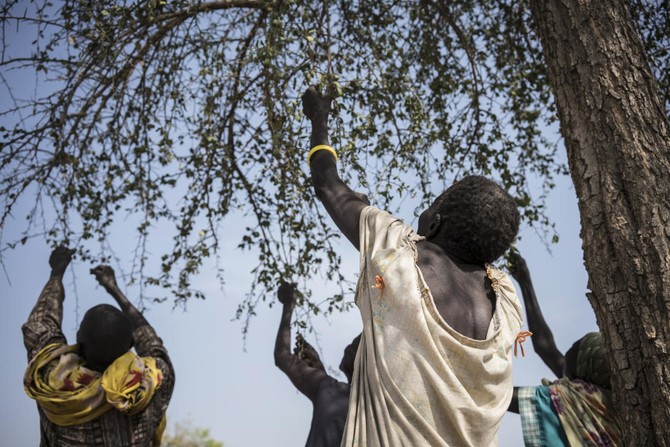By William Madouk
Locals in Pibor Administrative Area are resorting to eating wild vegetables and desert dates due to hunger and malnutrition, according to Oxfam South Sudan.
“People in South Sudan’s Pibor county are forced to survive on wild vegetables, and desert dates as the number of people dying from starvation rises,” partly read a statement seen by this outlet.
Oxfam warned that with torrential rains halting aid flights, the situation could get much worse.
According to the report, over 7 million people – half of the population are already facing extreme hunger, while nearly 79,000 people stare at food insecurity – a figure that experts say is double compared to the previous year.
In a statement, the Country Director for Oxfam South Sudan, Dr. Manenji Mangundu said the scenes of suffering are heart-wrenching, adding that more than 12 people died of hunger in July.
“Thousands of people both young and old are hungry and children are severely malnourished; many people are going for days without anything to eat. Just this month alone, (July) more than 12 people died from starvation,” he said.
“The situation will be aggravated by flooding that has started. Record-level flooding is forecasted for this rainy season (June- September), and likely to decimate crops and probably push approximately 3.3 million already vulnerable people to a breaking point.” He added.
According to a report, over 70% of the country, including Pibor region, has been affected by floods for the past 6 consecutive years.
This is heightened by the economic crisis and an ongoing conflict in neighbouring Sudan fuelling hunger levels in majority of communities within South Sudan.
These drivers have together forced the plummeting of the local currency and triggered the highest real food inflation since independence (164%) according to the World Bank, making it harder for people to access food.
The prices of staple foods such as wheat, sorghum, oil, and flour have all increased, with some more than tripled since March this year.
Adau Nyok, living in the capital of Juba said: “Three months ago, I used to buy 10kg of flour for 3500 SSP ($2). Now it costs me 15,000 SSP (USD 9.3). Unfortunately, the prices keep rising and we can no longer afford it due to lack of access to cash.”
As Oxfam and partners provide life-saving interventions like food, cash, clean water supplies and sanitation in South Sudan, Oxfam staff have heard harrowing stories from families who are losing their children due to hunger.
Rebecca Korok Nyarek, who lost her young nephew, said: “I lost my nephew because of hunger. He was just 15 years old. There is no food at home.”
She added “People are starving, and when you go out to the bushes in search of food, sometimes you will get something small to eat, even wild fruits are no longer available because of the rains and that’s how we sleep at night.’’
Fourteen months into the conflict in Sudan, over 750,000 returnees and refugees have fled to South Sudan where they are facing catastrophic conditions.
Transit centres in Renk and Malakal, designed for 4,000 people, are now sheltering more people than five times their capacity.
The situation is particularly dire for the refugees and returnees who are fleeing into South Sudan co-habiting with communities already facing extreme hunger while funding is very limited.
Famine is increasing rapidly among children in the overcrowded temporary transit camps along the Sudan-South Sudan borders, exacerbating the crisis, while aid agencies are pulling out due to lack of funding.
Aisha, a Sudanese refugee from Khartoum fled her home with her children after her husband was killed at his shop in the city: “We have arrived here and although the sounds of the guns are no longer there, our children are hungry.”
To her “Majority of the nights, we sleep on empty stomachs and now with the rains, our tents are sometimes washed away.”
Oxfam urgently needs $15 million to scale up its operations and save the lives of vulnerable children and women affected by the conflict, floods and diseases.
“Failing to respond when people are starving is a moral failing that must not continue. Without urgent assistance now we risk many more lives. Humanitarian assistance delayed is aid denied, donors must act now”




